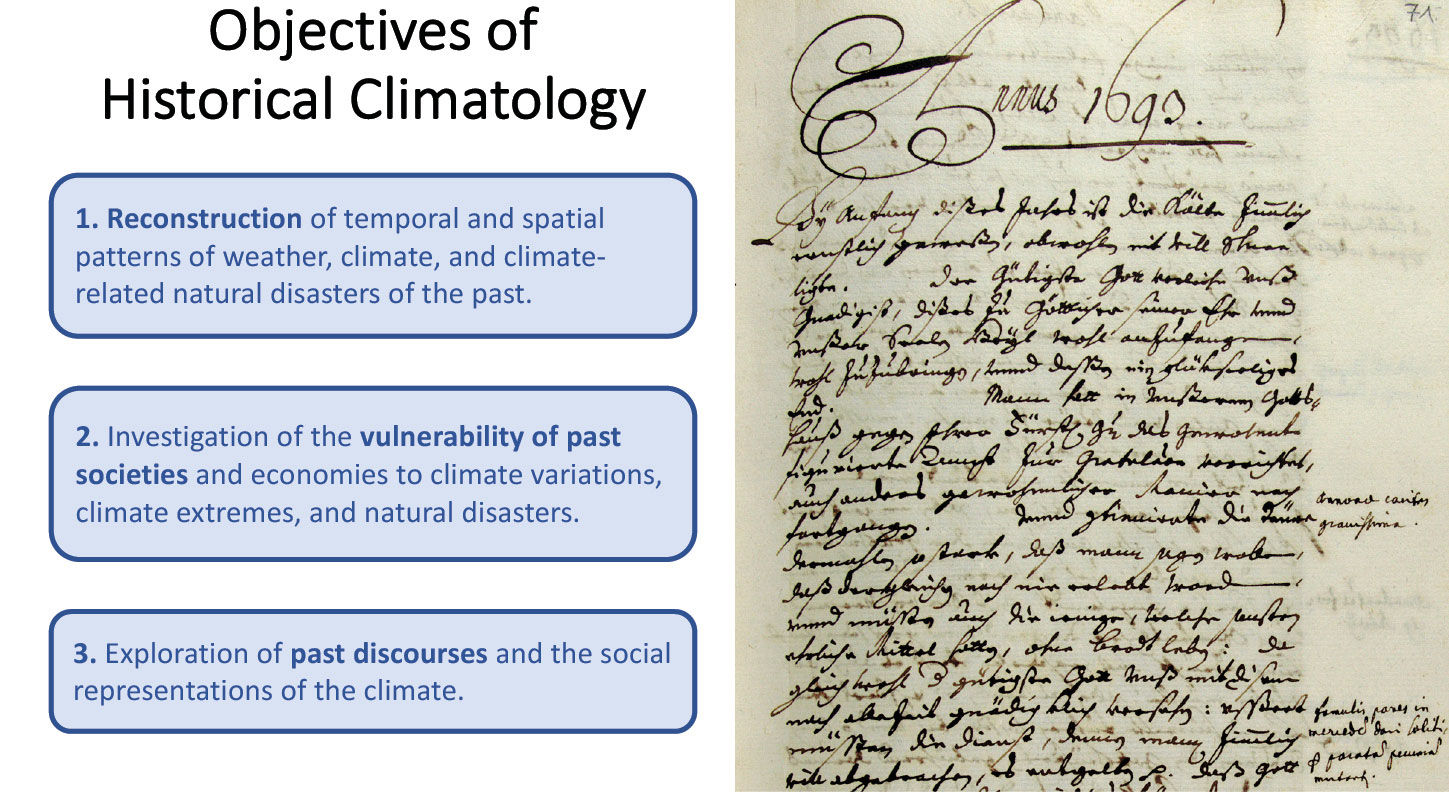- Home
- Publications
- PAGES Magazine
- Climate Reconstruction and Impacts From The Archives of Societies Working Group
Climate Reconstruction and Impacts from the Archives of Societies working group
Camenisch C, Bauch M, Huhtamaa H, Pei Q & White S
Past Global Changes Magazine
27(2)
73
2019
Chantal Camenisch1, M. Bauch2, H. Huhtamaa3, Q. Pei4 and S. White5
Historical climatology is the interdisciplinary field that explores past climates and the human dimension using written records, human artifacts, and early instrumental measurements, collectively termed "the archives of societies". These sources range from chronicles, diaries, and newspapers to flood markers on historic buildings and pre-standard thermometer and barometer readings (Brázdil et al. 2005; Fig. 1).
Research in historical climatology may both complement and extend research in paleoclimatology (Brönnimann et al. 2018). Similar to high-resolution natural archives, the archives of societies may contain proxies for one or more climate parameters dating back as far as several millennia, depending on the region and approach. Archives of society have the advantage of possibly containing seasonal or even monthly information and are not restricted to a particular period (e.g. the growing season). This factor may permit full-year reconstructions utilizing a single approach. In addition, written historical records may provide detailed meteorological descriptions and narratives enabling investigations of historical climate as well as weather impacts and adaptations.
Nevertheless, using the archives of societies poses significant challenges. Their information is neither as continuous nor homogenous as that provided by natural proxies, and their quantity and quality vary by region and tend to diminish further back in time. Historical climatology requires careful interpretation to overcome problems of subjectivity and errors of recording and transmission. Historical climatologists in different regions of the world have independently developed methods to address these problems but have not yet coordinated global best practices in source interpretation or production of data, nor has the field established clear language and standards for the attribution of past societal change to climatic variability and change.
Scientific goals
The recently established PAGES working group Climate Reconstruction and Impacts from the Archives of Societies (CRIAS, pastglobalchanges.org/crias) aims to improve methods in historical climatology and to coordinate global best practices in source interpretation and production of data, especially for use by paleoclimatologists and modelers. To this end, three main goals have been defined:
 |
|
Figure 1: Objectives of Historical Climatology (Brázdil et al. 2005) and examples of archives of society: page from a weather diary from a monk in Einsiedeln, Switzerland, written at the end of the 17th century. Credit: Diarium P. Josef Dietrich, Bd. 8 (1692-1694) (KAE, A.HB.8, S. 71) klosterarchiv.ch/e-archiv_archivalien.php |
1) Sharing methods among historical climatologists working in different regions to exchange best practices and ensure the compatibility of results
In East Asia and Europe, in particular, research in the field of historical climatology already has a long tradition. One goal of CRIAS is to intensify discussions regarding standards of source criticism and reconstruction methods among scholars from these two regions and to extend this discussion to other continents. This process has begun with a comprehensive worldwide review of methods for creating climate indices.
2) Working with paleoclimatologists and modelers to determine whether and how data drawn from the archives of societies may inform their research (and vice versa)
A closer collaboration between historical climatologists and paleoclimatologists seems very promising. To enable such a discussion, it is necessary to explore ways to solve problems derived from inhomogeneous records in the archives of society, the loss of low-frequency variability, and the treatment of uncertainties in reconstructions based on the methods of historical climatology.
3) Communicating standards of climatic causation used in historical research, especially for the benefit of natural and social scientists whose work has historical human dimensions
As with other interdisciplinary fields, historical climatology must deal with diverging disciplinary concepts, standards, and language used to address causality. This challenge arises particularly in the attribution of past societal changes to climatic variability or change. In order to avoid confusion among scholars in different disciplines as well as overly deterministic statements, CRIAS aims to promote more rigorous standards and language in historical climate impact and adaptation research.
Working group activities
In October 2018, a first workshop on "Methods and Interdisciplinary Communication in Historical Climatology" was organized in Bern, Switzerland (Camenisch et al. 2019). A second workshop was held in October 2019 in Leipzig, Germany, on "Integrating Documentary Evidence into Climate Reconstruction and Impact Studies" (dantean.hypotheses.org/crias), and a third workshop is scheduled in the second half of 2020 in Hong Kong. As a result of these activities, several papers and special issues are in preparation.
affiliations
1Oeschger Centre for Climate Change Research and Section of Economic, Social and Environmental History, University of Bern, Switzerland
2Leibniz Institute for the History and Culture of Eastern Europe, Leipzig, Germany
3Heidelberg Centre for the Environment, Germany
4Department of Social Sciences, Education University of Hong Kong, China
5Department of History, Ohio State University, Columbus, USA
contact
Chantal Camenisch: chantal.camenisch hist.unibe.ch
hist.unibe.ch
references
Brázdil R et al. (2005) Clim Change 70: 363-430
Brönnimann S et al. (2018) In: White S et al. (Eds) The Palgrave Handbook of Climate History. Palgrave Macmillan, 27-36
